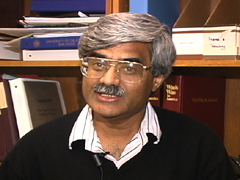Calit2?s Trivedi Invited to Participate in Blue Ribbon Panel on Video Surveillance
|
3.17.04 – A bipartisan organization in the nation’s capital has selected UCSD Jacobs School of Engineering professor Mohan Trivedi to sit on a blue-ribbon panel to examine the technological development and legal regulation of video surveillance. The discussion will focus on the impact of new and emerging video surveillance technologies on privacy and civil liberties.
The panel on “Video Surveillance: Legal and Technological Challenges” will take place March 23 at 9:30 a.m. at the Georgetown University Law Center in Washington D.C. The panel is organized and sponsored by the Constitution Project, Georgetown University, and the law firm of Wilmer Cutler Pickering LLP.
Trivedi is a professor of electrical and computer engineering at the Jacobs School. He is the director of UCSD’s Computer Vision and Robotics Research laboratory, and leads research on intelligent transportation and telematics within the California Institute for Telecommunications and Information Technology [Calit²], a partnership of UCSD and UC Irvine.
Along with his colleagues in CVRR, Trivedi is currently working on several projects in the field of computer vision, with funding from government agencies and private foundations. He is expected to outline recent advances in networks of ‘smart’ cameras that Trivedi has dubbed ‘distributed interactive video arrays’ (DIVAs). Trivedi’s current projects include development of an automated system for detecting and tracking “events of interest,” such as a vehicle stranded on a road, intruders approaching a protected perimeter, or persons around an information kiosk. The DIVA system links a network of 360-degree cameras, which interact “intelligently” thanks to sophisticated computer algorithms devised by the CVRR team. Said Trivedi: “One of the key research directions pursued in our research is to develop surveillance technologies with built-in privacy and security protections.” Research in his laboratory is funded by organizations including the Technical Support Working Group (TSWG), a federal, interagency organization that funds research to combat terrorism, and the National Science Foundation.
Speakers who will join Professor Trivedi on the panel include former Chief of Staff to President Clinton John Podesta; Washington D.C. chief of police Charles Ramsey; John Woodward Jr., director of the Biometrics Management Office in the U.S. Department of Defense; and others. Mr. Joseph Onek, who served as a law clerk for Supreme Court Justice William Brennan and was a Counsel to President Carter will moderate the panel, which will be attended by general public, reporters as well as congressional staffers.
Professor Trivedi welcomed the opportunity to participate in an open public forum to discuss the significance as well as implications of video surveillance. “Technology is only one of the elements in developing effective protections for people and property,” he noted. “It is important to engage legal scholars, Constitutional experts, law enforcement personnel, technologists and the public at large in an ongoing manner, as we work towards balancing security and freedoms in our society.”
The Constitution Project combines scholarship and activism using a wide variety of practical efforts to promote constitutional dialogue in settings outside the judiciary. As part of that effort, it creates bipartisan blue-ribbon committees of former government officials, judges, scholars, and other prominent citizens to reach across ideological and partisan lines, and across divides among the executive, judicial, and legislative branches.


